Environmental Factors Impacting Tasmanian Mountain Waters in China
VerifiedAdded on 2023/04/20
|18
|4174
|227
Report
AI Summary
This report examines the potential for Tasmanian Mountain Waters, an Australian bottled mineral water company, to expand its business into the Chinese market. It analyzes the various environmental factors that will influence the company's marketing campaign in China. These factors include economic growth, political policies, socio-cultural aspects (using Hofstede's cultural dimensions), and technological advancements. The report highlights the opportunities presented by China's growing bottled water market, rising GDP, and health-conscious consumers, as well as the challenges posed by political factors and cultural differences. It offers recommendations on how Tasmanian Mountain Waters can leverage its high-quality product and adapt its marketing strategies to succeed in the Chinese market, considering aspects like consumer preferences, cultural norms, and the use of technology. The report aims to provide a comprehensive overview of the market environment and offer practical insights for the company's global expansion efforts.
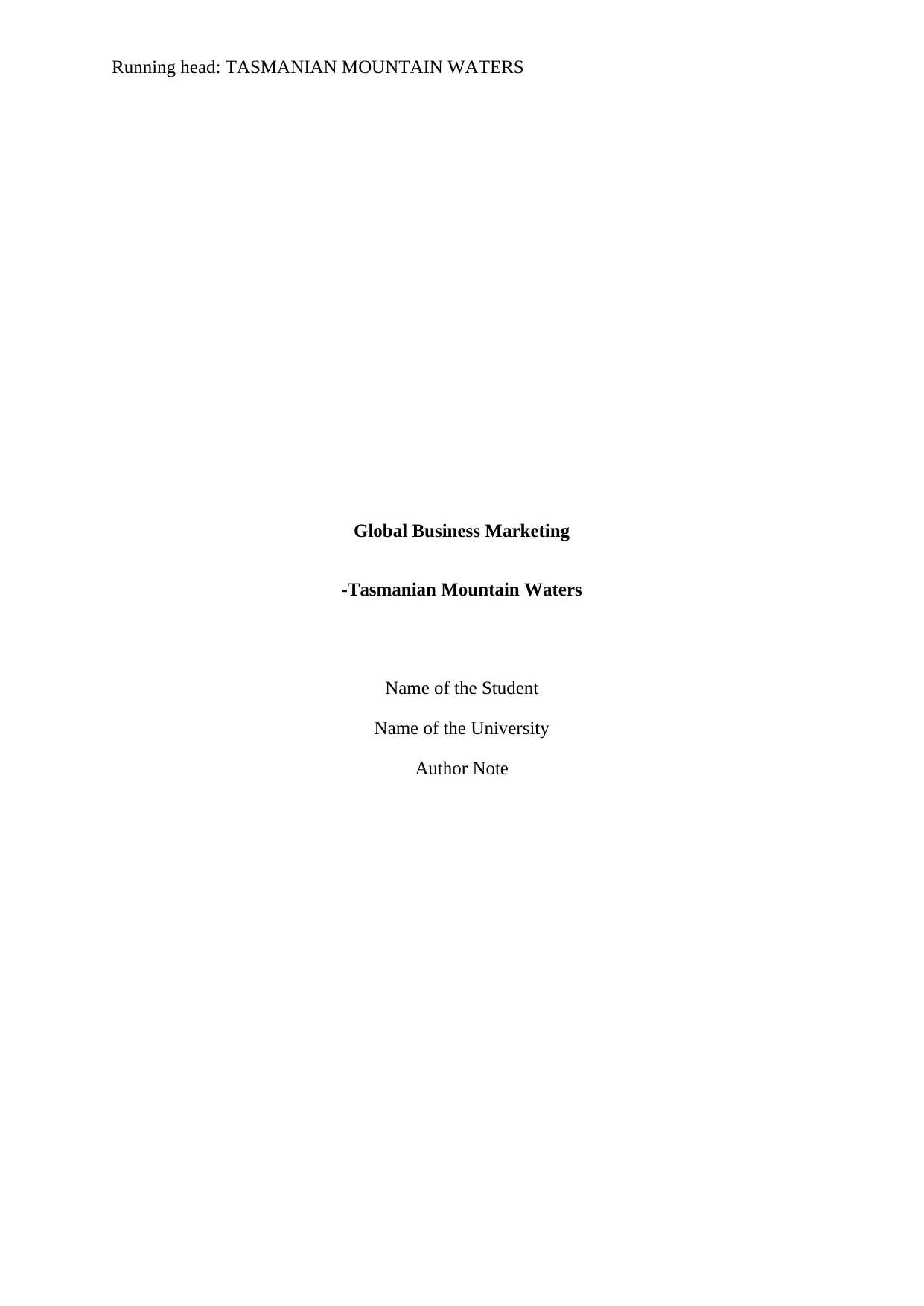
Running head: TASMANIAN MOUNTAIN WATERS
Global Business Marketing
-Tasmanian Mountain Waters
Name of the Student
Name of the University
Author Note
Global Business Marketing
-Tasmanian Mountain Waters
Name of the Student
Name of the University
Author Note
Paraphrase This Document
Need a fresh take? Get an instant paraphrase of this document with our AI Paraphraser
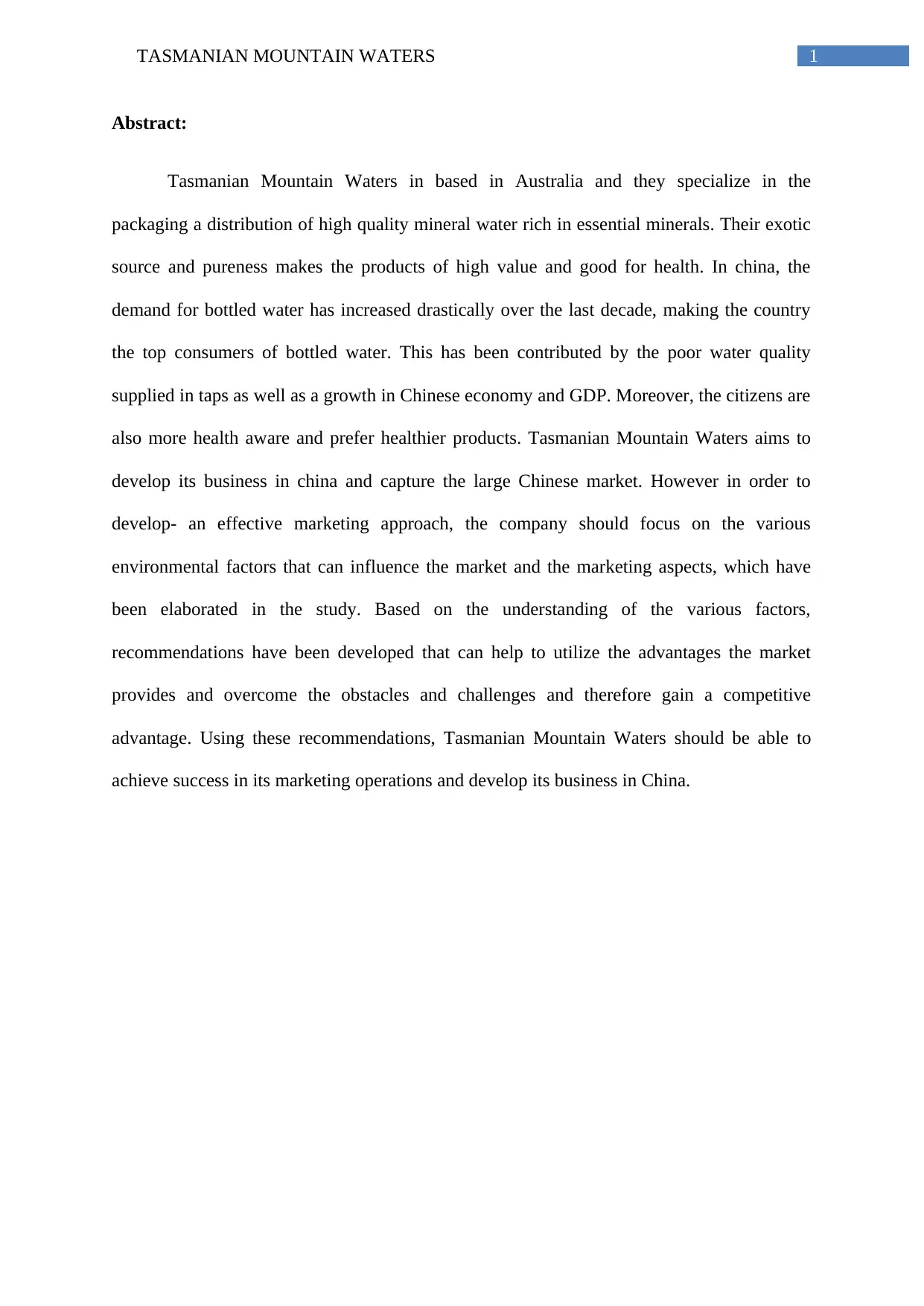
1TASMANIAN MOUNTAIN WATERS
Abstract:
Tasmanian Mountain Waters in based in Australia and they specialize in the
packaging a distribution of high quality mineral water rich in essential minerals. Their exotic
source and pureness makes the products of high value and good for health. In china, the
demand for bottled water has increased drastically over the last decade, making the country
the top consumers of bottled water. This has been contributed by the poor water quality
supplied in taps as well as a growth in Chinese economy and GDP. Moreover, the citizens are
also more health aware and prefer healthier products. Tasmanian Mountain Waters aims to
develop its business in china and capture the large Chinese market. However in order to
develop- an effective marketing approach, the company should focus on the various
environmental factors that can influence the market and the marketing aspects, which have
been elaborated in the study. Based on the understanding of the various factors,
recommendations have been developed that can help to utilize the advantages the market
provides and overcome the obstacles and challenges and therefore gain a competitive
advantage. Using these recommendations, Tasmanian Mountain Waters should be able to
achieve success in its marketing operations and develop its business in China.
Abstract:
Tasmanian Mountain Waters in based in Australia and they specialize in the
packaging a distribution of high quality mineral water rich in essential minerals. Their exotic
source and pureness makes the products of high value and good for health. In china, the
demand for bottled water has increased drastically over the last decade, making the country
the top consumers of bottled water. This has been contributed by the poor water quality
supplied in taps as well as a growth in Chinese economy and GDP. Moreover, the citizens are
also more health aware and prefer healthier products. Tasmanian Mountain Waters aims to
develop its business in china and capture the large Chinese market. However in order to
develop- an effective marketing approach, the company should focus on the various
environmental factors that can influence the market and the marketing aspects, which have
been elaborated in the study. Based on the understanding of the various factors,
recommendations have been developed that can help to utilize the advantages the market
provides and overcome the obstacles and challenges and therefore gain a competitive
advantage. Using these recommendations, Tasmanian Mountain Waters should be able to
achieve success in its marketing operations and develop its business in China.
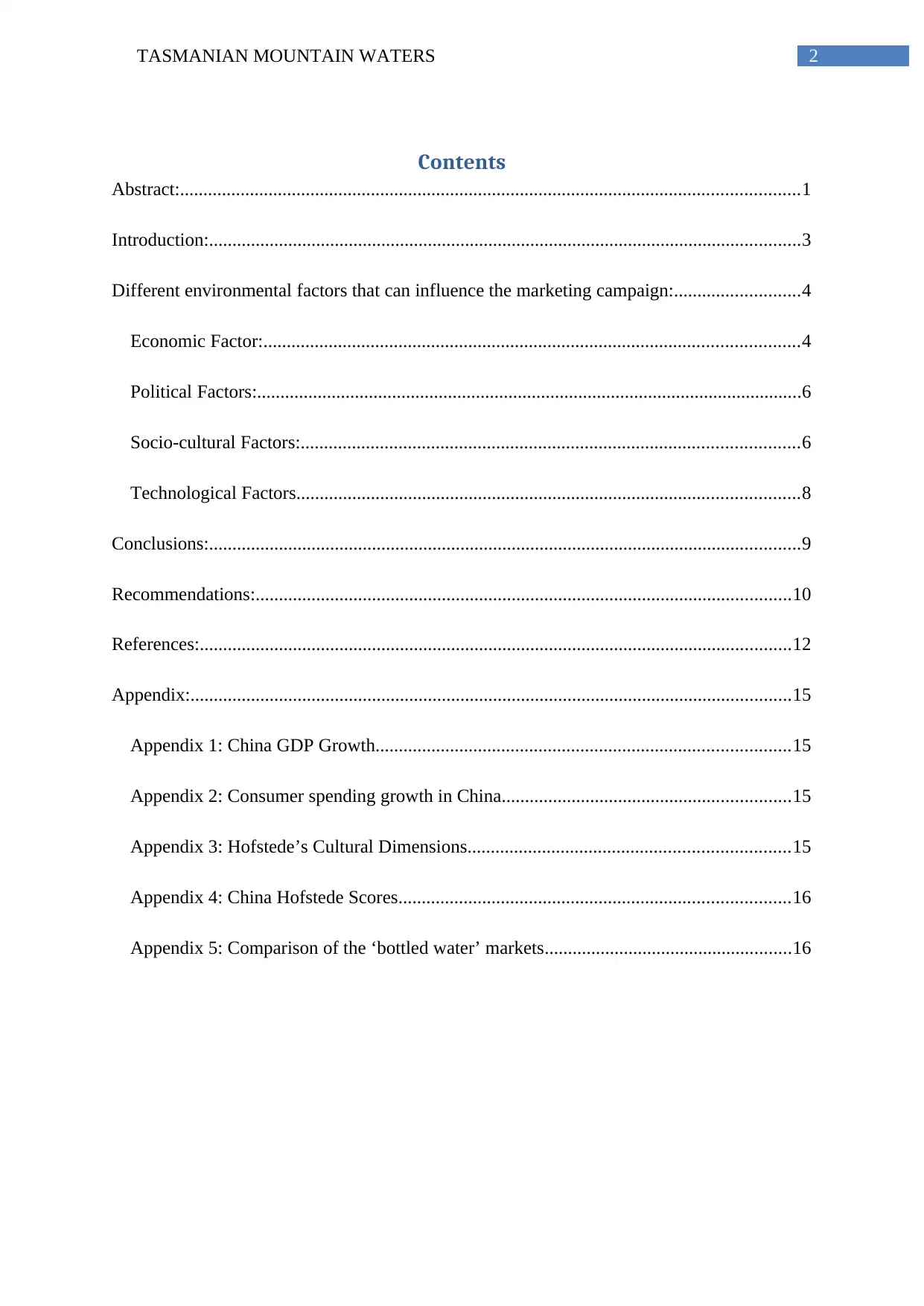
2TASMANIAN MOUNTAIN WATERS
Contents
Abstract:.....................................................................................................................................1
Introduction:...............................................................................................................................3
Different environmental factors that can influence the marketing campaign:...........................4
Economic Factor:...................................................................................................................4
Political Factors:.....................................................................................................................6
Socio-cultural Factors:...........................................................................................................6
Technological Factors............................................................................................................8
Conclusions:...............................................................................................................................9
Recommendations:...................................................................................................................10
References:...............................................................................................................................12
Appendix:.................................................................................................................................15
Appendix 1: China GDP Growth.........................................................................................15
Appendix 2: Consumer spending growth in China..............................................................15
Appendix 3: Hofstede’s Cultural Dimensions.....................................................................15
Appendix 4: China Hofstede Scores....................................................................................16
Appendix 5: Comparison of the ‘bottled water’ markets.....................................................16
Contents
Abstract:.....................................................................................................................................1
Introduction:...............................................................................................................................3
Different environmental factors that can influence the marketing campaign:...........................4
Economic Factor:...................................................................................................................4
Political Factors:.....................................................................................................................6
Socio-cultural Factors:...........................................................................................................6
Technological Factors............................................................................................................8
Conclusions:...............................................................................................................................9
Recommendations:...................................................................................................................10
References:...............................................................................................................................12
Appendix:.................................................................................................................................15
Appendix 1: China GDP Growth.........................................................................................15
Appendix 2: Consumer spending growth in China..............................................................15
Appendix 3: Hofstede’s Cultural Dimensions.....................................................................15
Appendix 4: China Hofstede Scores....................................................................................16
Appendix 5: Comparison of the ‘bottled water’ markets.....................................................16
⊘ This is a preview!⊘
Do you want full access?
Subscribe today to unlock all pages.

Trusted by 1+ million students worldwide
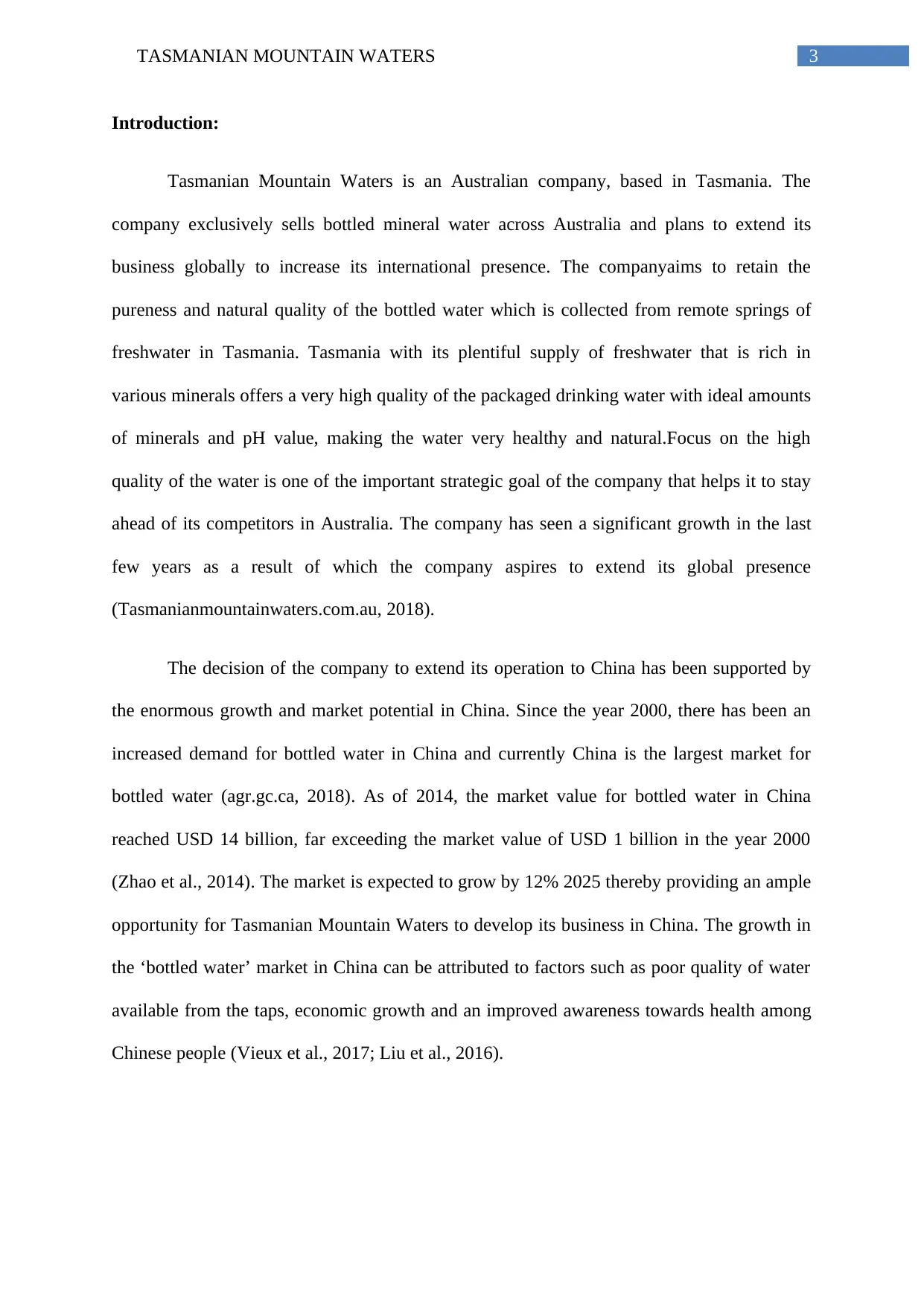
3TASMANIAN MOUNTAIN WATERS
Introduction:
Tasmanian Mountain Waters is an Australian company, based in Tasmania. The
company exclusively sells bottled mineral water across Australia and plans to extend its
business globally to increase its international presence. The companyaims to retain the
pureness and natural quality of the bottled water which is collected from remote springs of
freshwater in Tasmania. Tasmania with its plentiful supply of freshwater that is rich in
various minerals offers a very high quality of the packaged drinking water with ideal amounts
of minerals and pH value, making the water very healthy and natural.Focus on the high
quality of the water is one of the important strategic goal of the company that helps it to stay
ahead of its competitors in Australia. The company has seen a significant growth in the last
few years as a result of which the company aspires to extend its global presence
(Tasmanianmountainwaters.com.au, 2018).
The decision of the company to extend its operation to China has been supported by
the enormous growth and market potential in China. Since the year 2000, there has been an
increased demand for bottled water in China and currently China is the largest market for
bottled water (agr.gc.ca, 2018). As of 2014, the market value for bottled water in China
reached USD 14 billion, far exceeding the market value of USD 1 billion in the year 2000
(Zhao et al., 2014). The market is expected to grow by 12% 2025 thereby providing an ample
opportunity for Tasmanian Mountain Waters to develop its business in China. The growth in
the ‘bottled water’ market in China can be attributed to factors such as poor quality of water
available from the taps, economic growth and an improved awareness towards health among
Chinese people (Vieux et al., 2017; Liu et al., 2016).
Introduction:
Tasmanian Mountain Waters is an Australian company, based in Tasmania. The
company exclusively sells bottled mineral water across Australia and plans to extend its
business globally to increase its international presence. The companyaims to retain the
pureness and natural quality of the bottled water which is collected from remote springs of
freshwater in Tasmania. Tasmania with its plentiful supply of freshwater that is rich in
various minerals offers a very high quality of the packaged drinking water with ideal amounts
of minerals and pH value, making the water very healthy and natural.Focus on the high
quality of the water is one of the important strategic goal of the company that helps it to stay
ahead of its competitors in Australia. The company has seen a significant growth in the last
few years as a result of which the company aspires to extend its global presence
(Tasmanianmountainwaters.com.au, 2018).
The decision of the company to extend its operation to China has been supported by
the enormous growth and market potential in China. Since the year 2000, there has been an
increased demand for bottled water in China and currently China is the largest market for
bottled water (agr.gc.ca, 2018). As of 2014, the market value for bottled water in China
reached USD 14 billion, far exceeding the market value of USD 1 billion in the year 2000
(Zhao et al., 2014). The market is expected to grow by 12% 2025 thereby providing an ample
opportunity for Tasmanian Mountain Waters to develop its business in China. The growth in
the ‘bottled water’ market in China can be attributed to factors such as poor quality of water
available from the taps, economic growth and an improved awareness towards health among
Chinese people (Vieux et al., 2017; Liu et al., 2016).
Paraphrase This Document
Need a fresh take? Get an instant paraphrase of this document with our AI Paraphraser
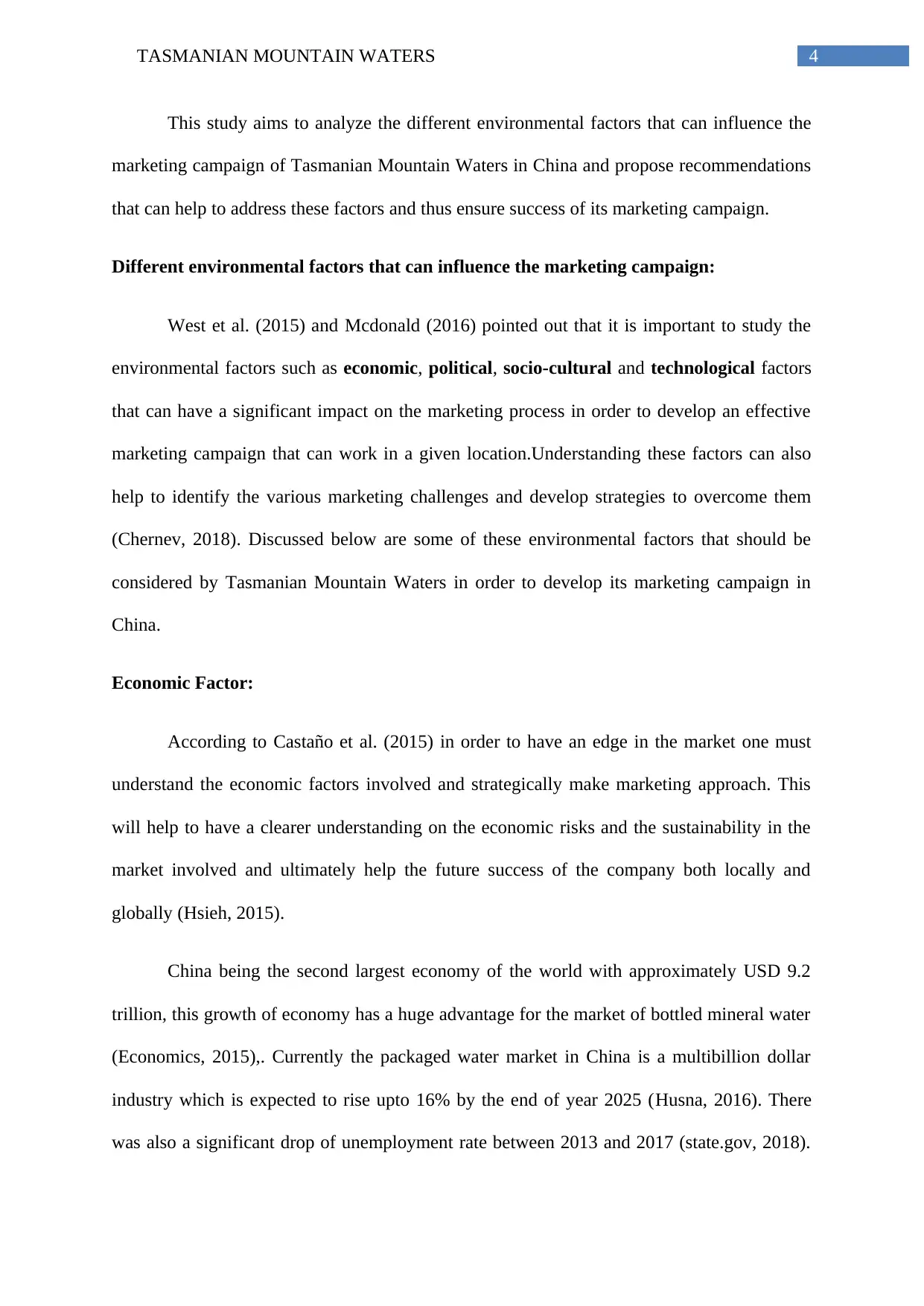
4TASMANIAN MOUNTAIN WATERS
This study aims to analyze the different environmental factors that can influence the
marketing campaign of Tasmanian Mountain Waters in China and propose recommendations
that can help to address these factors and thus ensure success of its marketing campaign.
Different environmental factors that can influence the marketing campaign:
West et al. (2015) and Mcdonald (2016) pointed out that it is important to study the
environmental factors such as economic, political, socio-cultural and technological factors
that can have a significant impact on the marketing process in order to develop an effective
marketing campaign that can work in a given location.Understanding these factors can also
help to identify the various marketing challenges and develop strategies to overcome them
(Chernev, 2018). Discussed below are some of these environmental factors that should be
considered by Tasmanian Mountain Waters in order to develop its marketing campaign in
China.
Economic Factor:
According to Castaño et al. (2015) in order to have an edge in the market one must
understand the economic factors involved and strategically make marketing approach. This
will help to have a clearer understanding on the economic risks and the sustainability in the
market involved and ultimately help the future success of the company both locally and
globally (Hsieh, 2015).
China being the second largest economy of the world with approximately USD 9.2
trillion, this growth of economy has a huge advantage for the market of bottled mineral water
(Economics, 2015),. Currently the packaged water market in China is a multibillion dollar
industry which is expected to rise upto 16% by the end of year 2025 (Husna, 2016). There
was also a significant drop of unemployment rate between 2013 and 2017 (state.gov, 2018).
This study aims to analyze the different environmental factors that can influence the
marketing campaign of Tasmanian Mountain Waters in China and propose recommendations
that can help to address these factors and thus ensure success of its marketing campaign.
Different environmental factors that can influence the marketing campaign:
West et al. (2015) and Mcdonald (2016) pointed out that it is important to study the
environmental factors such as economic, political, socio-cultural and technological factors
that can have a significant impact on the marketing process in order to develop an effective
marketing campaign that can work in a given location.Understanding these factors can also
help to identify the various marketing challenges and develop strategies to overcome them
(Chernev, 2018). Discussed below are some of these environmental factors that should be
considered by Tasmanian Mountain Waters in order to develop its marketing campaign in
China.
Economic Factor:
According to Castaño et al. (2015) in order to have an edge in the market one must
understand the economic factors involved and strategically make marketing approach. This
will help to have a clearer understanding on the economic risks and the sustainability in the
market involved and ultimately help the future success of the company both locally and
globally (Hsieh, 2015).
China being the second largest economy of the world with approximately USD 9.2
trillion, this growth of economy has a huge advantage for the market of bottled mineral water
(Economics, 2015),. Currently the packaged water market in China is a multibillion dollar
industry which is expected to rise upto 16% by the end of year 2025 (Husna, 2016). There
was also a significant drop of unemployment rate between 2013 and 2017 (state.gov, 2018).
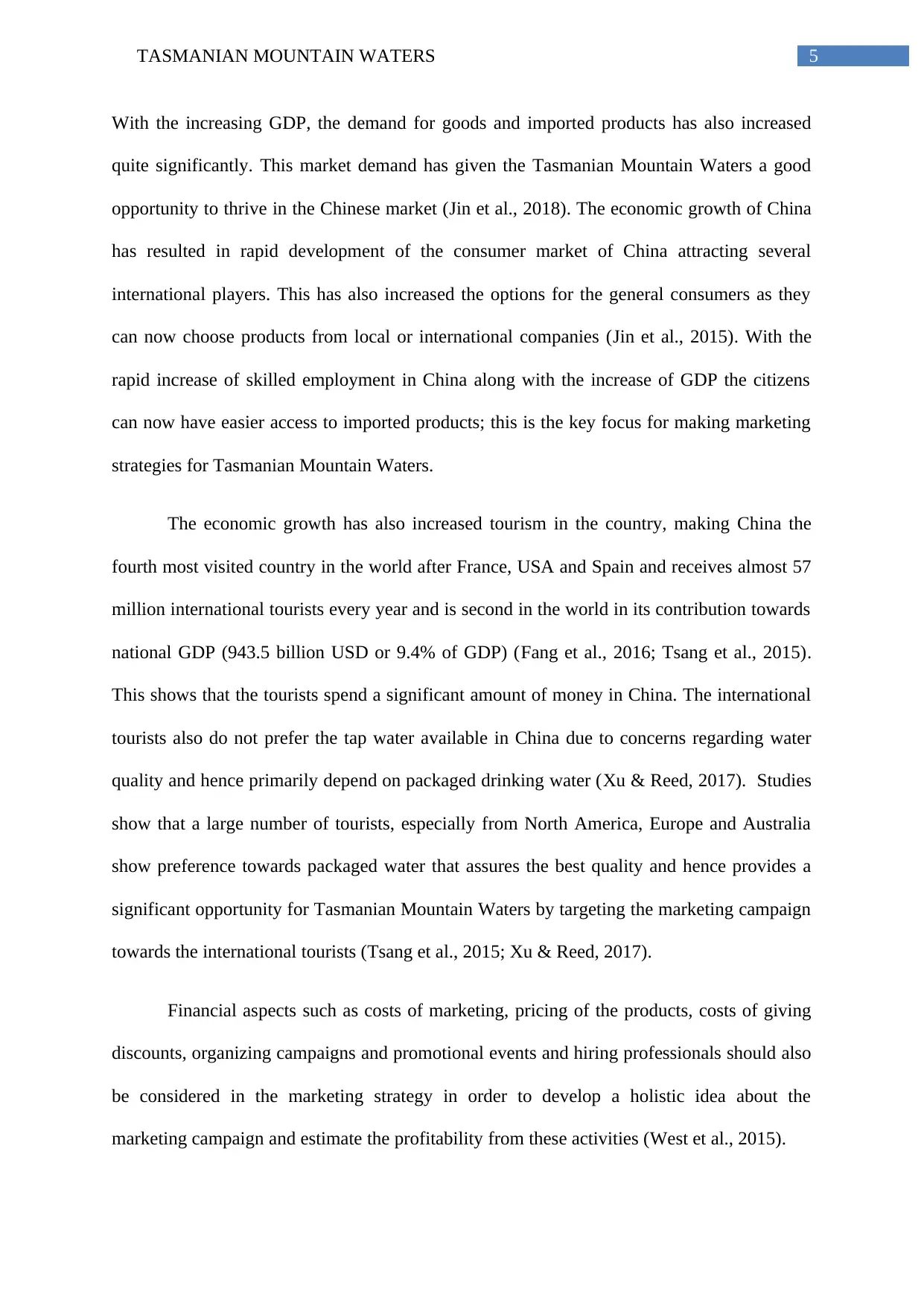
5TASMANIAN MOUNTAIN WATERS
With the increasing GDP, the demand for goods and imported products has also increased
quite significantly. This market demand has given the Tasmanian Mountain Waters a good
opportunity to thrive in the Chinese market (Jin et al., 2018). The economic growth of China
has resulted in rapid development of the consumer market of China attracting several
international players. This has also increased the options for the general consumers as they
can now choose products from local or international companies (Jin et al., 2015). With the
rapid increase of skilled employment in China along with the increase of GDP the citizens
can now have easier access to imported products; this is the key focus for making marketing
strategies for Tasmanian Mountain Waters.
The economic growth has also increased tourism in the country, making China the
fourth most visited country in the world after France, USA and Spain and receives almost 57
million international tourists every year and is second in the world in its contribution towards
national GDP (943.5 billion USD or 9.4% of GDP) (Fang et al., 2016; Tsang et al., 2015).
This shows that the tourists spend a significant amount of money in China. The international
tourists also do not prefer the tap water available in China due to concerns regarding water
quality and hence primarily depend on packaged drinking water (Xu & Reed, 2017). Studies
show that a large number of tourists, especially from North America, Europe and Australia
show preference towards packaged water that assures the best quality and hence provides a
significant opportunity for Tasmanian Mountain Waters by targeting the marketing campaign
towards the international tourists (Tsang et al., 2015; Xu & Reed, 2017).
Financial aspects such as costs of marketing, pricing of the products, costs of giving
discounts, organizing campaigns and promotional events and hiring professionals should also
be considered in the marketing strategy in order to develop a holistic idea about the
marketing campaign and estimate the profitability from these activities (West et al., 2015).
With the increasing GDP, the demand for goods and imported products has also increased
quite significantly. This market demand has given the Tasmanian Mountain Waters a good
opportunity to thrive in the Chinese market (Jin et al., 2018). The economic growth of China
has resulted in rapid development of the consumer market of China attracting several
international players. This has also increased the options for the general consumers as they
can now choose products from local or international companies (Jin et al., 2015). With the
rapid increase of skilled employment in China along with the increase of GDP the citizens
can now have easier access to imported products; this is the key focus for making marketing
strategies for Tasmanian Mountain Waters.
The economic growth has also increased tourism in the country, making China the
fourth most visited country in the world after France, USA and Spain and receives almost 57
million international tourists every year and is second in the world in its contribution towards
national GDP (943.5 billion USD or 9.4% of GDP) (Fang et al., 2016; Tsang et al., 2015).
This shows that the tourists spend a significant amount of money in China. The international
tourists also do not prefer the tap water available in China due to concerns regarding water
quality and hence primarily depend on packaged drinking water (Xu & Reed, 2017). Studies
show that a large number of tourists, especially from North America, Europe and Australia
show preference towards packaged water that assures the best quality and hence provides a
significant opportunity for Tasmanian Mountain Waters by targeting the marketing campaign
towards the international tourists (Tsang et al., 2015; Xu & Reed, 2017).
Financial aspects such as costs of marketing, pricing of the products, costs of giving
discounts, organizing campaigns and promotional events and hiring professionals should also
be considered in the marketing strategy in order to develop a holistic idea about the
marketing campaign and estimate the profitability from these activities (West et al., 2015).
⊘ This is a preview!⊘
Do you want full access?
Subscribe today to unlock all pages.

Trusted by 1+ million students worldwide
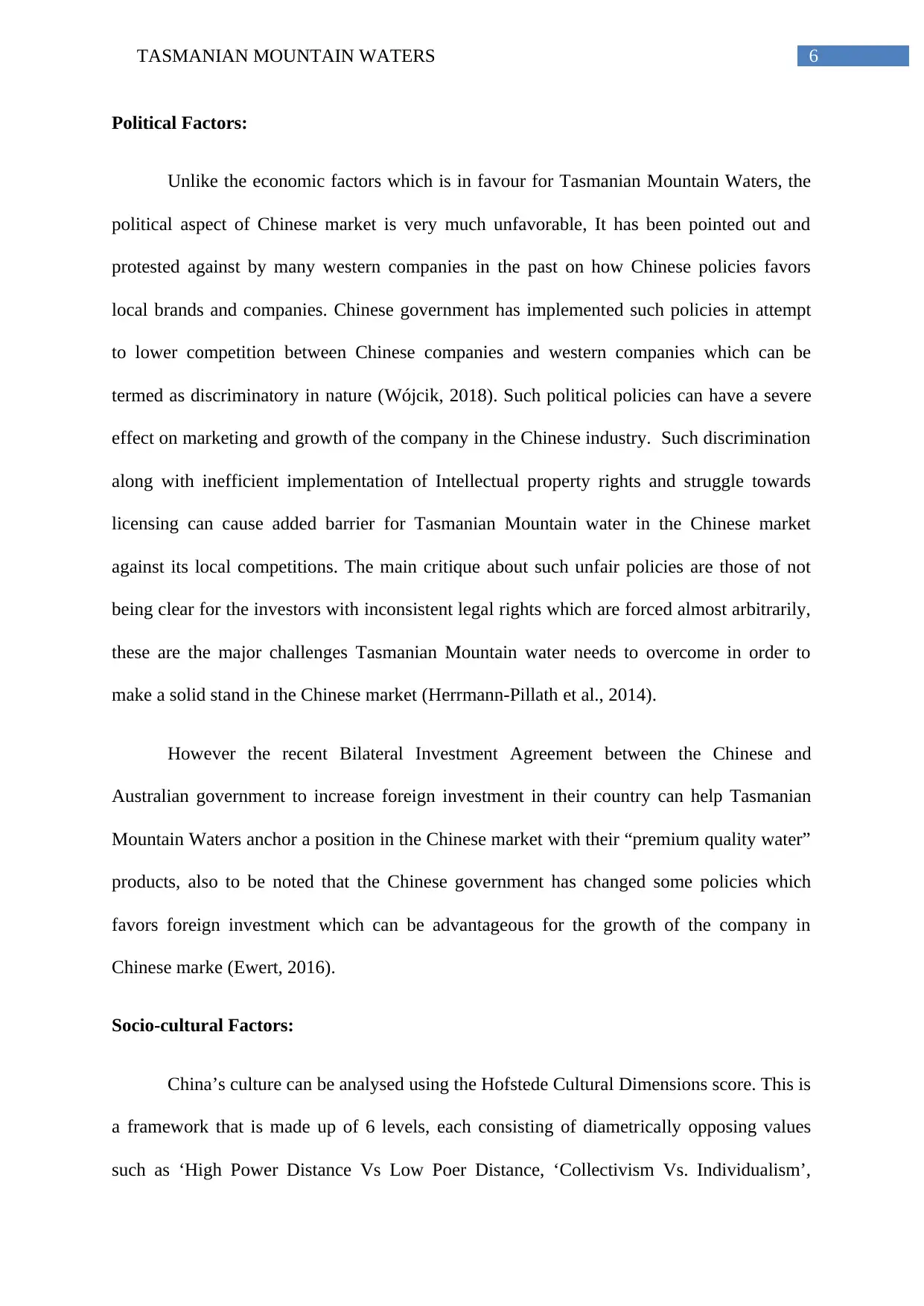
6TASMANIAN MOUNTAIN WATERS
Political Factors:
Unlike the economic factors which is in favour for Tasmanian Mountain Waters, the
political aspect of Chinese market is very much unfavorable, It has been pointed out and
protested against by many western companies in the past on how Chinese policies favors
local brands and companies. Chinese government has implemented such policies in attempt
to lower competition between Chinese companies and western companies which can be
termed as discriminatory in nature (Wójcik, 2018). Such political policies can have a severe
effect on marketing and growth of the company in the Chinese industry. Such discrimination
along with inefficient implementation of Intellectual property rights and struggle towards
licensing can cause added barrier for Tasmanian Mountain water in the Chinese market
against its local competitions. The main critique about such unfair policies are those of not
being clear for the investors with inconsistent legal rights which are forced almost arbitrarily,
these are the major challenges Tasmanian Mountain water needs to overcome in order to
make a solid stand in the Chinese market (Herrmann-Pillath et al., 2014).
However the recent Bilateral Investment Agreement between the Chinese and
Australian government to increase foreign investment in their country can help Tasmanian
Mountain Waters anchor a position in the Chinese market with their “premium quality water”
products, also to be noted that the Chinese government has changed some policies which
favors foreign investment which can be advantageous for the growth of the company in
Chinese marke (Ewert, 2016).
Socio-cultural Factors:
China’s culture can be analysed using the Hofstede Cultural Dimensions score. This is
a framework that is made up of 6 levels, each consisting of diametrically opposing values
such as ‘High Power Distance Vs Low Poer Distance, ‘Collectivism Vs. Individualism’,
Political Factors:
Unlike the economic factors which is in favour for Tasmanian Mountain Waters, the
political aspect of Chinese market is very much unfavorable, It has been pointed out and
protested against by many western companies in the past on how Chinese policies favors
local brands and companies. Chinese government has implemented such policies in attempt
to lower competition between Chinese companies and western companies which can be
termed as discriminatory in nature (Wójcik, 2018). Such political policies can have a severe
effect on marketing and growth of the company in the Chinese industry. Such discrimination
along with inefficient implementation of Intellectual property rights and struggle towards
licensing can cause added barrier for Tasmanian Mountain water in the Chinese market
against its local competitions. The main critique about such unfair policies are those of not
being clear for the investors with inconsistent legal rights which are forced almost arbitrarily,
these are the major challenges Tasmanian Mountain water needs to overcome in order to
make a solid stand in the Chinese market (Herrmann-Pillath et al., 2014).
However the recent Bilateral Investment Agreement between the Chinese and
Australian government to increase foreign investment in their country can help Tasmanian
Mountain Waters anchor a position in the Chinese market with their “premium quality water”
products, also to be noted that the Chinese government has changed some policies which
favors foreign investment which can be advantageous for the growth of the company in
Chinese marke (Ewert, 2016).
Socio-cultural Factors:
China’s culture can be analysed using the Hofstede Cultural Dimensions score. This is
a framework that is made up of 6 levels, each consisting of diametrically opposing values
such as ‘High Power Distance Vs Low Poer Distance, ‘Collectivism Vs. Individualism’,
Paraphrase This Document
Need a fresh take? Get an instant paraphrase of this document with our AI Paraphraser
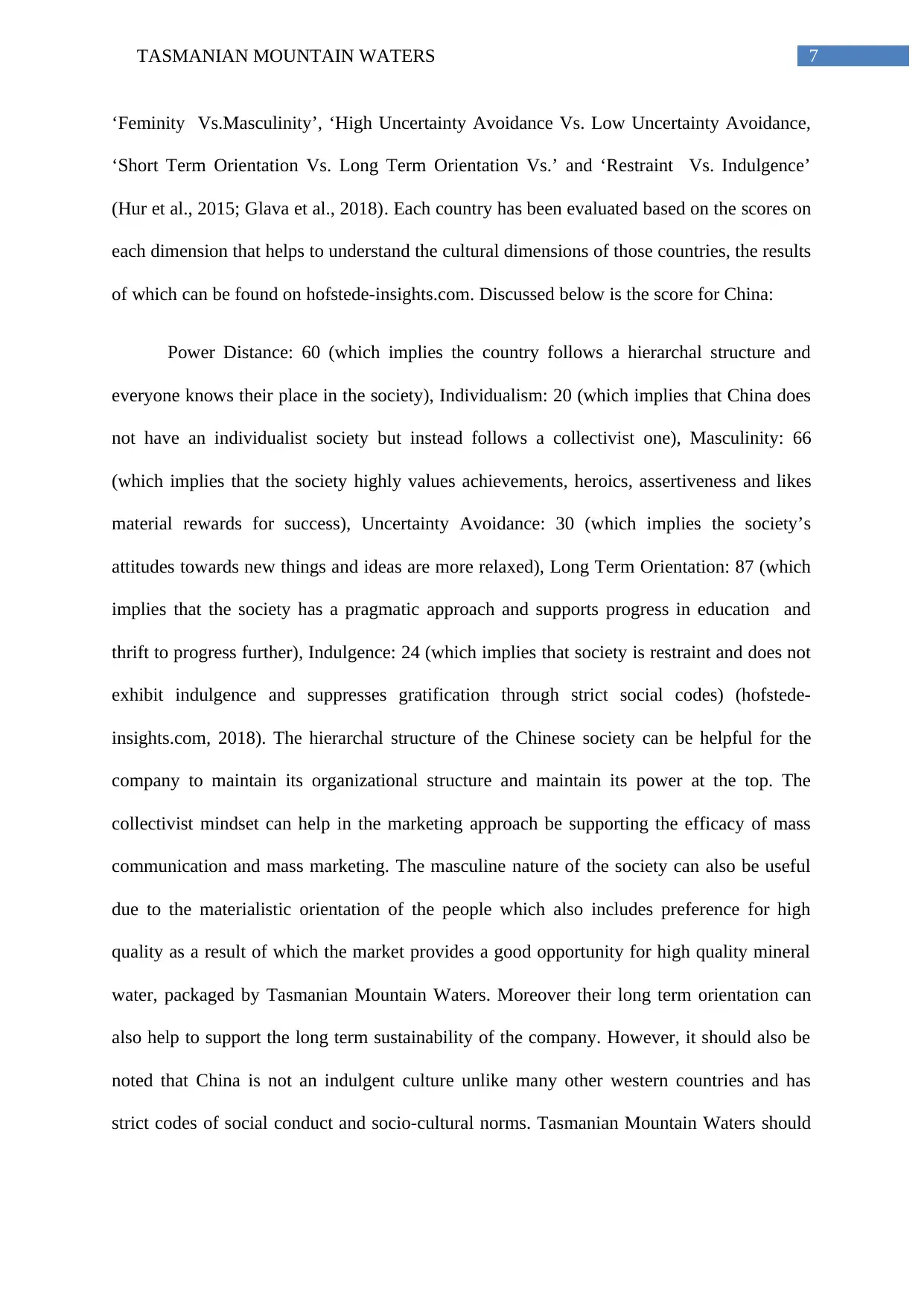
7TASMANIAN MOUNTAIN WATERS
‘Feminity Vs.Masculinity’, ‘High Uncertainty Avoidance Vs. Low Uncertainty Avoidance,
‘Short Term Orientation Vs. Long Term Orientation Vs.’ and ‘Restraint Vs. Indulgence’
(Hur et al., 2015; Glava et al., 2018). Each country has been evaluated based on the scores on
each dimension that helps to understand the cultural dimensions of those countries, the results
of which can be found on hofstede-insights.com. Discussed below is the score for China:
Power Distance: 60 (which implies the country follows a hierarchal structure and
everyone knows their place in the society), Individualism: 20 (which implies that China does
not have an individualist society but instead follows a collectivist one), Masculinity: 66
(which implies that the society highly values achievements, heroics, assertiveness and likes
material rewards for success), Uncertainty Avoidance: 30 (which implies the society’s
attitudes towards new things and ideas are more relaxed), Long Term Orientation: 87 (which
implies that the society has a pragmatic approach and supports progress in education and
thrift to progress further), Indulgence: 24 (which implies that society is restraint and does not
exhibit indulgence and suppresses gratification through strict social codes) (hofstede-
insights.com, 2018). The hierarchal structure of the Chinese society can be helpful for the
company to maintain its organizational structure and maintain its power at the top. The
collectivist mindset can help in the marketing approach be supporting the efficacy of mass
communication and mass marketing. The masculine nature of the society can also be useful
due to the materialistic orientation of the people which also includes preference for high
quality as a result of which the market provides a good opportunity for high quality mineral
water, packaged by Tasmanian Mountain Waters. Moreover their long term orientation can
also help to support the long term sustainability of the company. However, it should also be
noted that China is not an indulgent culture unlike many other western countries and has
strict codes of social conduct and socio-cultural norms. Tasmanian Mountain Waters should
‘Feminity Vs.Masculinity’, ‘High Uncertainty Avoidance Vs. Low Uncertainty Avoidance,
‘Short Term Orientation Vs. Long Term Orientation Vs.’ and ‘Restraint Vs. Indulgence’
(Hur et al., 2015; Glava et al., 2018). Each country has been evaluated based on the scores on
each dimension that helps to understand the cultural dimensions of those countries, the results
of which can be found on hofstede-insights.com. Discussed below is the score for China:
Power Distance: 60 (which implies the country follows a hierarchal structure and
everyone knows their place in the society), Individualism: 20 (which implies that China does
not have an individualist society but instead follows a collectivist one), Masculinity: 66
(which implies that the society highly values achievements, heroics, assertiveness and likes
material rewards for success), Uncertainty Avoidance: 30 (which implies the society’s
attitudes towards new things and ideas are more relaxed), Long Term Orientation: 87 (which
implies that the society has a pragmatic approach and supports progress in education and
thrift to progress further), Indulgence: 24 (which implies that society is restraint and does not
exhibit indulgence and suppresses gratification through strict social codes) (hofstede-
insights.com, 2018). The hierarchal structure of the Chinese society can be helpful for the
company to maintain its organizational structure and maintain its power at the top. The
collectivist mindset can help in the marketing approach be supporting the efficacy of mass
communication and mass marketing. The masculine nature of the society can also be useful
due to the materialistic orientation of the people which also includes preference for high
quality as a result of which the market provides a good opportunity for high quality mineral
water, packaged by Tasmanian Mountain Waters. Moreover their long term orientation can
also help to support the long term sustainability of the company. However, it should also be
noted that China is not an indulgent culture unlike many other western countries and has
strict codes of social conduct and socio-cultural norms. Tasmanian Mountain Waters should
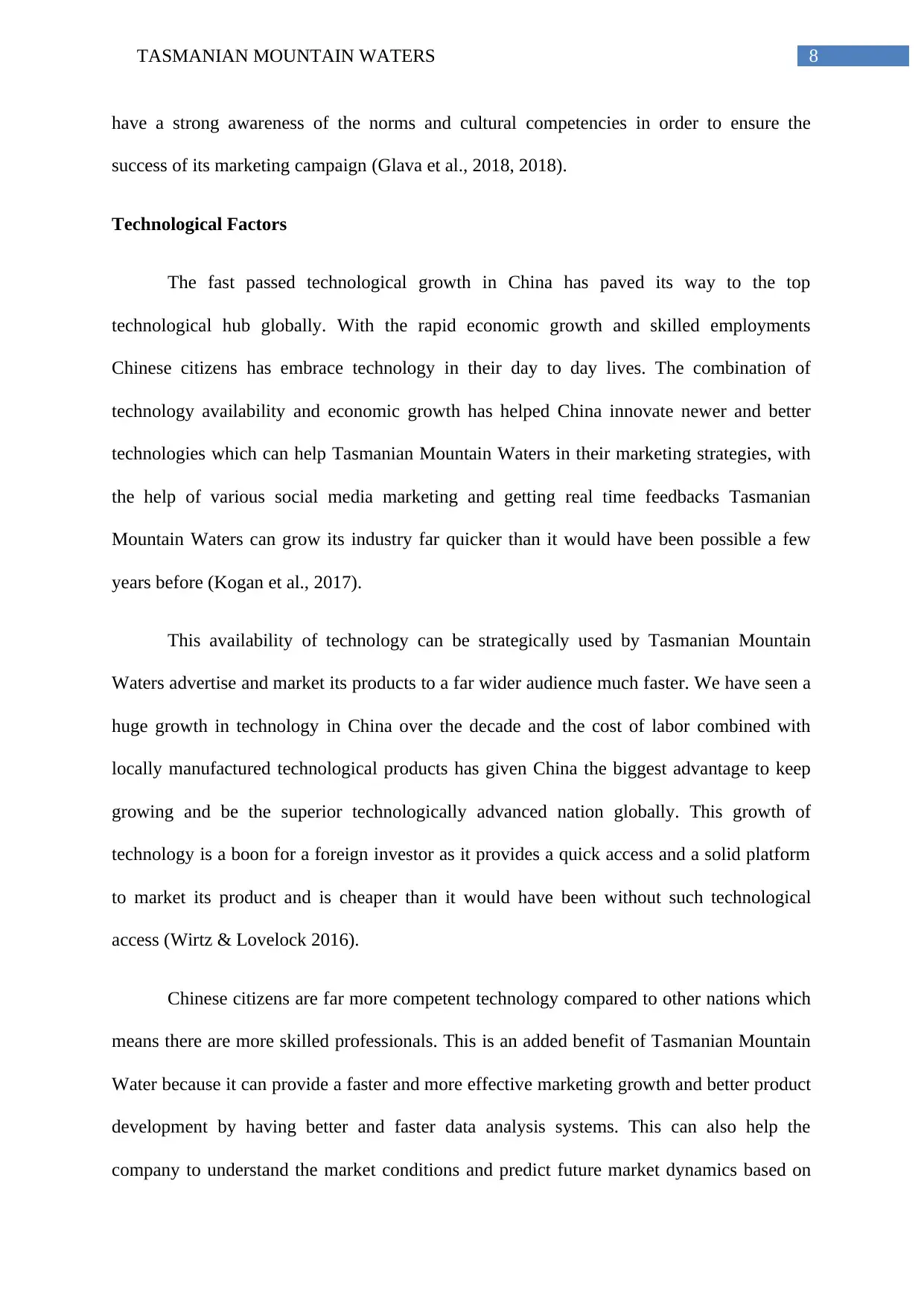
8TASMANIAN MOUNTAIN WATERS
have a strong awareness of the norms and cultural competencies in order to ensure the
success of its marketing campaign (Glava et al., 2018, 2018).
Technological Factors
The fast passed technological growth in China has paved its way to the top
technological hub globally. With the rapid economic growth and skilled employments
Chinese citizens has embrace technology in their day to day lives. The combination of
technology availability and economic growth has helped China innovate newer and better
technologies which can help Tasmanian Mountain Waters in their marketing strategies, with
the help of various social media marketing and getting real time feedbacks Tasmanian
Mountain Waters can grow its industry far quicker than it would have been possible a few
years before (Kogan et al., 2017).
This availability of technology can be strategically used by Tasmanian Mountain
Waters advertise and market its products to a far wider audience much faster. We have seen a
huge growth in technology in China over the decade and the cost of labor combined with
locally manufactured technological products has given China the biggest advantage to keep
growing and be the superior technologically advanced nation globally. This growth of
technology is a boon for a foreign investor as it provides a quick access and a solid platform
to market its product and is cheaper than it would have been without such technological
access (Wirtz & Lovelock 2016).
Chinese citizens are far more competent technology compared to other nations which
means there are more skilled professionals. This is an added benefit of Tasmanian Mountain
Water because it can provide a faster and more effective marketing growth and better product
development by having better and faster data analysis systems. This can also help the
company to understand the market conditions and predict future market dynamics based on
have a strong awareness of the norms and cultural competencies in order to ensure the
success of its marketing campaign (Glava et al., 2018, 2018).
Technological Factors
The fast passed technological growth in China has paved its way to the top
technological hub globally. With the rapid economic growth and skilled employments
Chinese citizens has embrace technology in their day to day lives. The combination of
technology availability and economic growth has helped China innovate newer and better
technologies which can help Tasmanian Mountain Waters in their marketing strategies, with
the help of various social media marketing and getting real time feedbacks Tasmanian
Mountain Waters can grow its industry far quicker than it would have been possible a few
years before (Kogan et al., 2017).
This availability of technology can be strategically used by Tasmanian Mountain
Waters advertise and market its products to a far wider audience much faster. We have seen a
huge growth in technology in China over the decade and the cost of labor combined with
locally manufactured technological products has given China the biggest advantage to keep
growing and be the superior technologically advanced nation globally. This growth of
technology is a boon for a foreign investor as it provides a quick access and a solid platform
to market its product and is cheaper than it would have been without such technological
access (Wirtz & Lovelock 2016).
Chinese citizens are far more competent technology compared to other nations which
means there are more skilled professionals. This is an added benefit of Tasmanian Mountain
Water because it can provide a faster and more effective marketing growth and better product
development by having better and faster data analysis systems. This can also help the
company to understand the market conditions and predict future market dynamics based on
⊘ This is a preview!⊘
Do you want full access?
Subscribe today to unlock all pages.

Trusted by 1+ million students worldwide
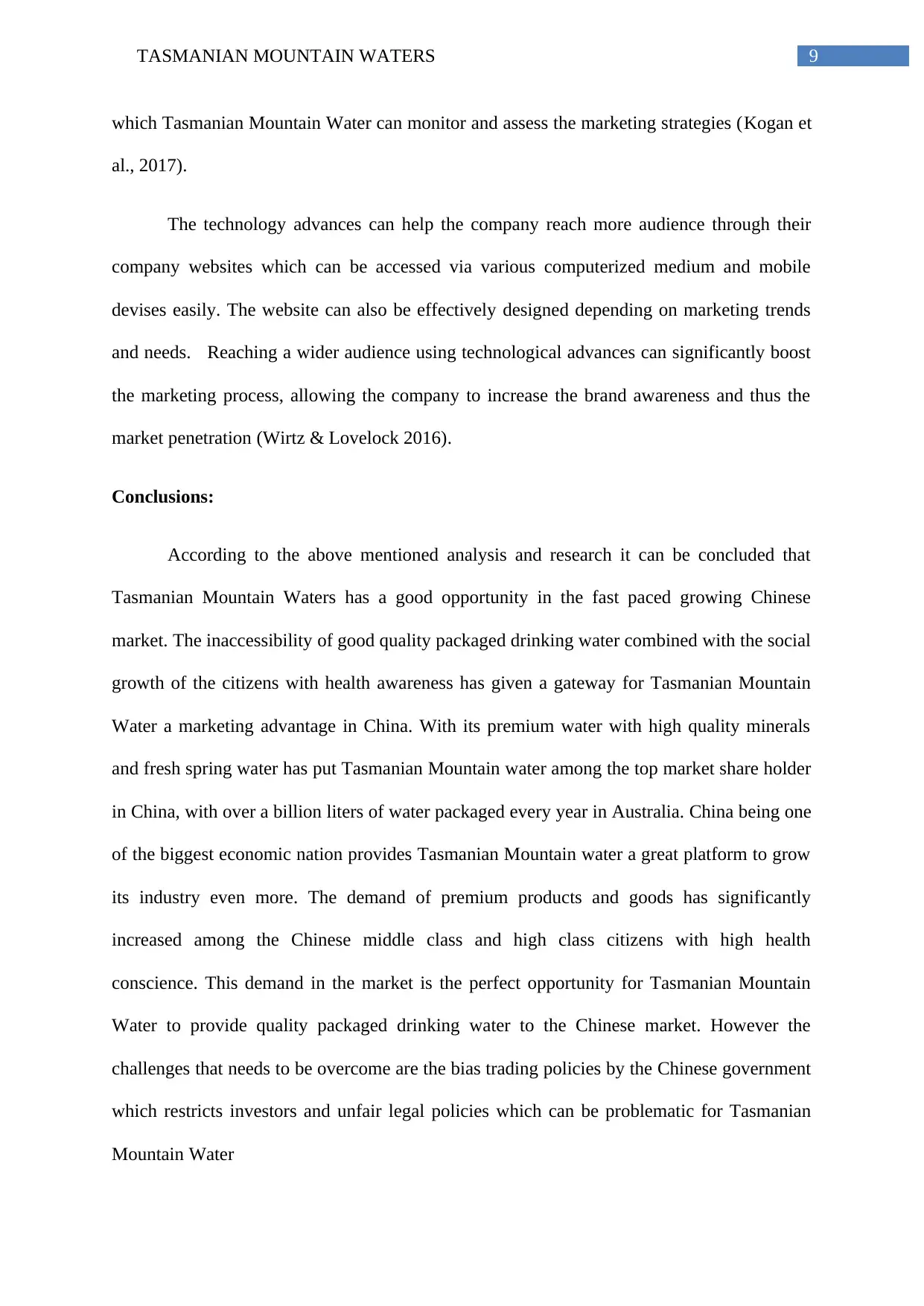
9TASMANIAN MOUNTAIN WATERS
which Tasmanian Mountain Water can monitor and assess the marketing strategies (Kogan et
al., 2017).
The technology advances can help the company reach more audience through their
company websites which can be accessed via various computerized medium and mobile
devises easily. The website can also be effectively designed depending on marketing trends
and needs. Reaching a wider audience using technological advances can significantly boost
the marketing process, allowing the company to increase the brand awareness and thus the
market penetration (Wirtz & Lovelock 2016).
Conclusions:
According to the above mentioned analysis and research it can be concluded that
Tasmanian Mountain Waters has a good opportunity in the fast paced growing Chinese
market. The inaccessibility of good quality packaged drinking water combined with the social
growth of the citizens with health awareness has given a gateway for Tasmanian Mountain
Water a marketing advantage in China. With its premium water with high quality minerals
and fresh spring water has put Tasmanian Mountain water among the top market share holder
in China, with over a billion liters of water packaged every year in Australia. China being one
of the biggest economic nation provides Tasmanian Mountain water a great platform to grow
its industry even more. The demand of premium products and goods has significantly
increased among the Chinese middle class and high class citizens with high health
conscience. This demand in the market is the perfect opportunity for Tasmanian Mountain
Water to provide quality packaged drinking water to the Chinese market. However the
challenges that needs to be overcome are the bias trading policies by the Chinese government
which restricts investors and unfair legal policies which can be problematic for Tasmanian
Mountain Water
which Tasmanian Mountain Water can monitor and assess the marketing strategies (Kogan et
al., 2017).
The technology advances can help the company reach more audience through their
company websites which can be accessed via various computerized medium and mobile
devises easily. The website can also be effectively designed depending on marketing trends
and needs. Reaching a wider audience using technological advances can significantly boost
the marketing process, allowing the company to increase the brand awareness and thus the
market penetration (Wirtz & Lovelock 2016).
Conclusions:
According to the above mentioned analysis and research it can be concluded that
Tasmanian Mountain Waters has a good opportunity in the fast paced growing Chinese
market. The inaccessibility of good quality packaged drinking water combined with the social
growth of the citizens with health awareness has given a gateway for Tasmanian Mountain
Water a marketing advantage in China. With its premium water with high quality minerals
and fresh spring water has put Tasmanian Mountain water among the top market share holder
in China, with over a billion liters of water packaged every year in Australia. China being one
of the biggest economic nation provides Tasmanian Mountain water a great platform to grow
its industry even more. The demand of premium products and goods has significantly
increased among the Chinese middle class and high class citizens with high health
conscience. This demand in the market is the perfect opportunity for Tasmanian Mountain
Water to provide quality packaged drinking water to the Chinese market. However the
challenges that needs to be overcome are the bias trading policies by the Chinese government
which restricts investors and unfair legal policies which can be problematic for Tasmanian
Mountain Water
Paraphrase This Document
Need a fresh take? Get an instant paraphrase of this document with our AI Paraphraser
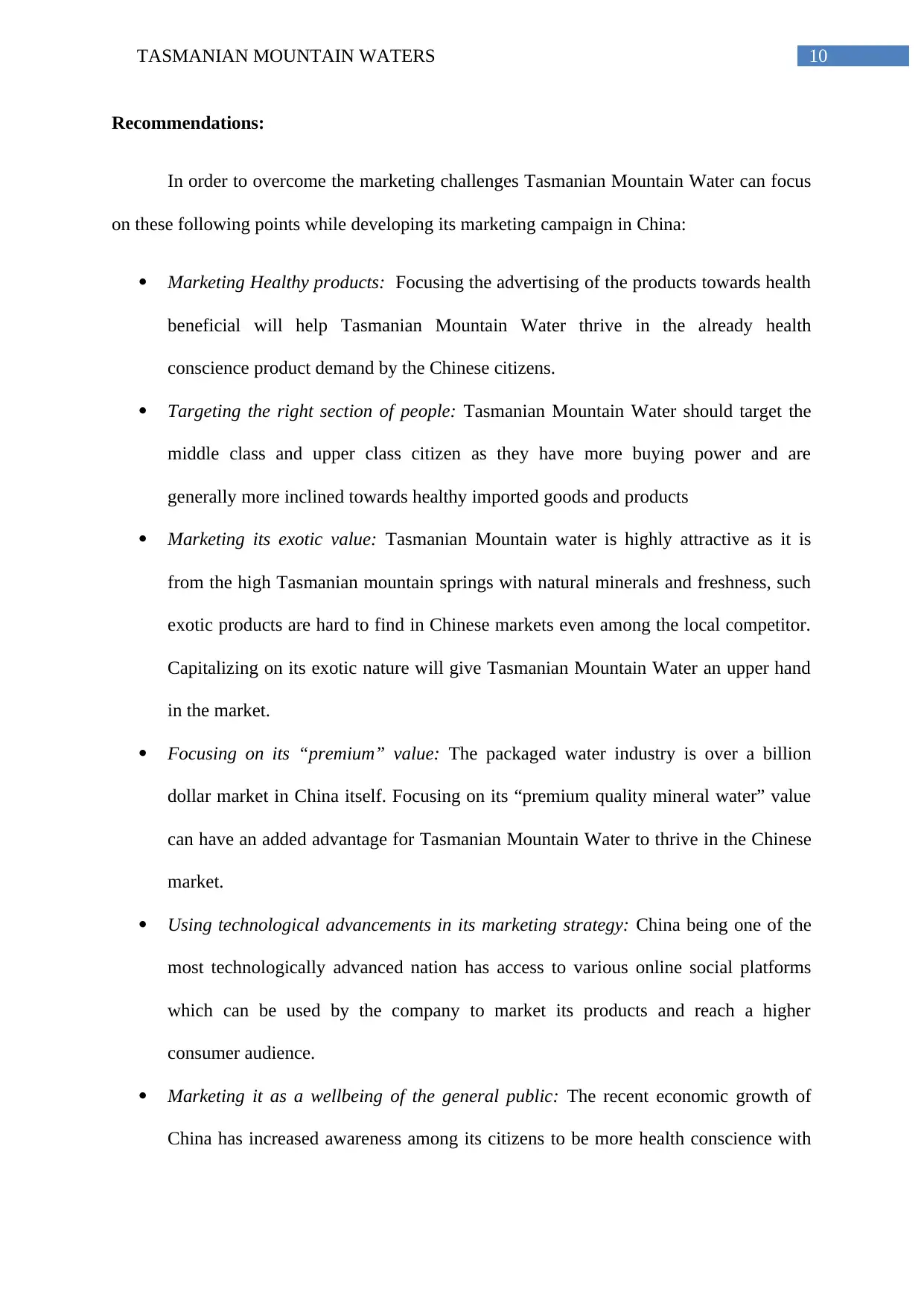
10TASMANIAN MOUNTAIN WATERS
Recommendations:
In order to overcome the marketing challenges Tasmanian Mountain Water can focus
on these following points while developing its marketing campaign in China:
Marketing Healthy products: Focusing the advertising of the products towards health
beneficial will help Tasmanian Mountain Water thrive in the already health
conscience product demand by the Chinese citizens.
Targeting the right section of people: Tasmanian Mountain Water should target the
middle class and upper class citizen as they have more buying power and are
generally more inclined towards healthy imported goods and products
Marketing its exotic value: Tasmanian Mountain water is highly attractive as it is
from the high Tasmanian mountain springs with natural minerals and freshness, such
exotic products are hard to find in Chinese markets even among the local competitor.
Capitalizing on its exotic nature will give Tasmanian Mountain Water an upper hand
in the market.
Focusing on its “premium” value: The packaged water industry is over a billion
dollar market in China itself. Focusing on its “premium quality mineral water” value
can have an added advantage for Tasmanian Mountain Water to thrive in the Chinese
market.
Using technological advancements in its marketing strategy: China being one of the
most technologically advanced nation has access to various online social platforms
which can be used by the company to market its products and reach a higher
consumer audience.
Marketing it as a wellbeing of the general public: The recent economic growth of
China has increased awareness among its citizens to be more health conscience with
Recommendations:
In order to overcome the marketing challenges Tasmanian Mountain Water can focus
on these following points while developing its marketing campaign in China:
Marketing Healthy products: Focusing the advertising of the products towards health
beneficial will help Tasmanian Mountain Water thrive in the already health
conscience product demand by the Chinese citizens.
Targeting the right section of people: Tasmanian Mountain Water should target the
middle class and upper class citizen as they have more buying power and are
generally more inclined towards healthy imported goods and products
Marketing its exotic value: Tasmanian Mountain water is highly attractive as it is
from the high Tasmanian mountain springs with natural minerals and freshness, such
exotic products are hard to find in Chinese markets even among the local competitor.
Capitalizing on its exotic nature will give Tasmanian Mountain Water an upper hand
in the market.
Focusing on its “premium” value: The packaged water industry is over a billion
dollar market in China itself. Focusing on its “premium quality mineral water” value
can have an added advantage for Tasmanian Mountain Water to thrive in the Chinese
market.
Using technological advancements in its marketing strategy: China being one of the
most technologically advanced nation has access to various online social platforms
which can be used by the company to market its products and reach a higher
consumer audience.
Marketing it as a wellbeing of the general public: The recent economic growth of
China has increased awareness among its citizens to be more health conscience with
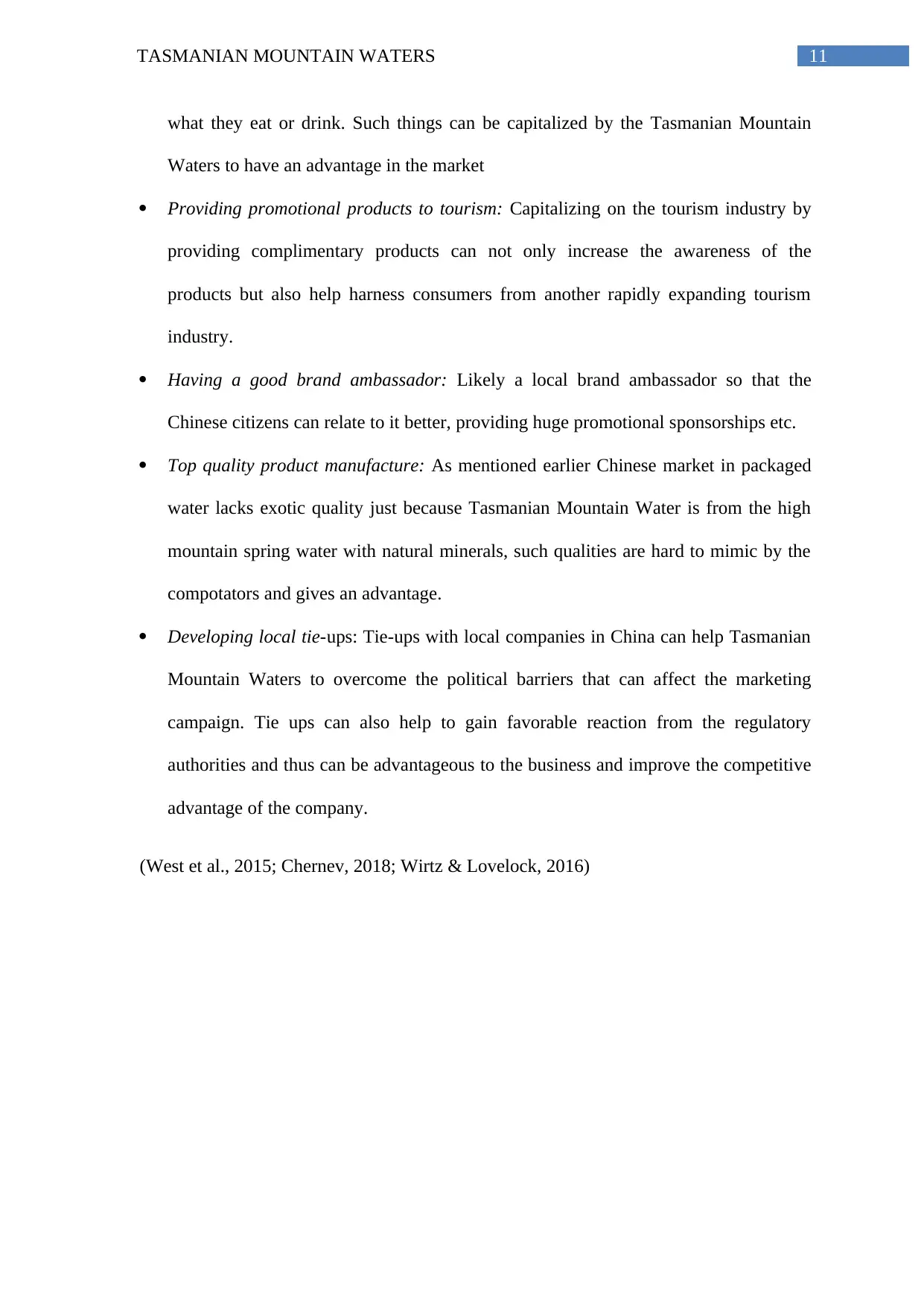
11TASMANIAN MOUNTAIN WATERS
what they eat or drink. Such things can be capitalized by the Tasmanian Mountain
Waters to have an advantage in the market
Providing promotional products to tourism: Capitalizing on the tourism industry by
providing complimentary products can not only increase the awareness of the
products but also help harness consumers from another rapidly expanding tourism
industry.
Having a good brand ambassador: Likely a local brand ambassador so that the
Chinese citizens can relate to it better, providing huge promotional sponsorships etc.
Top quality product manufacture: As mentioned earlier Chinese market in packaged
water lacks exotic quality just because Tasmanian Mountain Water is from the high
mountain spring water with natural minerals, such qualities are hard to mimic by the
compotators and gives an advantage.
Developing local tie-ups: Tie-ups with local companies in China can help Tasmanian
Mountain Waters to overcome the political barriers that can affect the marketing
campaign. Tie ups can also help to gain favorable reaction from the regulatory
authorities and thus can be advantageous to the business and improve the competitive
advantage of the company.
(West et al., 2015; Chernev, 2018; Wirtz & Lovelock, 2016)
what they eat or drink. Such things can be capitalized by the Tasmanian Mountain
Waters to have an advantage in the market
Providing promotional products to tourism: Capitalizing on the tourism industry by
providing complimentary products can not only increase the awareness of the
products but also help harness consumers from another rapidly expanding tourism
industry.
Having a good brand ambassador: Likely a local brand ambassador so that the
Chinese citizens can relate to it better, providing huge promotional sponsorships etc.
Top quality product manufacture: As mentioned earlier Chinese market in packaged
water lacks exotic quality just because Tasmanian Mountain Water is from the high
mountain spring water with natural minerals, such qualities are hard to mimic by the
compotators and gives an advantage.
Developing local tie-ups: Tie-ups with local companies in China can help Tasmanian
Mountain Waters to overcome the political barriers that can affect the marketing
campaign. Tie ups can also help to gain favorable reaction from the regulatory
authorities and thus can be advantageous to the business and improve the competitive
advantage of the company.
(West et al., 2015; Chernev, 2018; Wirtz & Lovelock, 2016)
⊘ This is a preview!⊘
Do you want full access?
Subscribe today to unlock all pages.

Trusted by 1+ million students worldwide
1 out of 18
Related Documents
Your All-in-One AI-Powered Toolkit for Academic Success.
+13062052269
info@desklib.com
Available 24*7 on WhatsApp / Email
![[object Object]](/_next/static/media/star-bottom.7253800d.svg)
Unlock your academic potential
Copyright © 2020–2025 A2Z Services. All Rights Reserved. Developed and managed by ZUCOL.





